Bishop Connolly school family responds to news of closure with love and support
By Dave Jolivet Editor davejolivet@anchornews.org



FALL RIVER — On March 8, the Diocese of Fall River announced that Bishop Connolly High School in Fall River would cease operations at the end of the 2022-23 academic year. Despite the diocese’s best efforts to maintain the operational and financial viability of this school, the continued decline in enrollment and substantial financial impact of the pandemic and current economic environment proved unsustainable.
their parents and guardians, and the faculty and staff, it has been a time when this group has rallied around each other for support and comfort.
are very saddened with the news of the closing of your school. We know how hard you and the staff work to build a community of love and values that we decided to send our daughter to your school. We appreciate everything you have done and we will pray for everyone.”
News about the closing of Bishop Connolly High School came as a shock to many in the Fall River community and beyond. What had been a mainstay in the city’s north end on Elsbree Street since 1966 is closing its doors at the end of the current academic year.

While the news was a terrible blow, especially to the students,
Over the past several years, the Diocese of Fall River has worked hard to maintain educational excellence, expand enrollment and recruitment activities, and bolster financial aid opportunities at the school. Despite these efforts, Bishop Connolly has experienced a significant decline in enrollment and, as a result, the diocese has spent over $1 million to sustain the school over the past five years. The diocese said in a press release that it no longer has the resources to continue to keep Bishop Connolly operational.
“While we sincerely regret having to close Bishop Connolly, our ultimate goal is to strengthen Catholic education in the Diocese
8 Turn to page 13
Hundreds from across the area attend return of diocesan Women’s and Men’s Conference

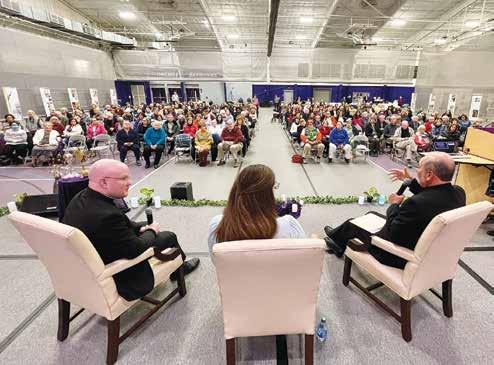
EASTON — “It’s so good to be together again,” a very pleased Bishop Edgar M. da Cunha, S.D.V., said in remarks welcoming the hundreds of faithful to the first in-person Women’s and Men’s Conference held in the Diocese of Fall River in three years because of postponements due to the coronavirus pandemic. The Lenten day of spiritual renewal took place on Saturday, March 11, in the Ames Sports Complex at Stonehill College in Easton.
It was his hope, the bishop shared, that attendees would be able as best they could to put aside “our concerns, troubles, and busyness of our daily lives” for an opportunity to “experience strengthening and renewal of faith.”
The conference theme of “Receive Jesus, Worship Jesus,” mirroring the National Eucharistic Revival now underway, was reflected in
the day’s multifaceted program. It was “a day of prayer, listening, reflection, and sharing now crowned with the celebration of the Eucharist,” said Bishop da Cunha, before beginning a Mass to close the conference. The bishop was the principal celebrant and homilist.
Reflecting on the Gospel passage of the Samaritan woman meeting Jesus at the well and forever being changed because of it, Bishop da Cunha explained in his homily that that experience should be ours as well.
“When we encounter Jesus, that’s what ought to happen. We should be changed,” he said.
All of us thirst like the Samaritan woman at the well, he continued, but “only Jesus has the waters that quench our thirst forever; only Jesus has all the answers; only Jesus offers the ultimate fulfillment of

March 24, 2023
8 Turn to page eight
“W e
Bishop Edgar M. da Cunha, S.D.V., right, and presenters Father Roger Landry and Mari Pablo, take part in a Question and Answer session at the recent diocesan Women’s and Men’s Conference in Easton. (Photo by Deacon Alan Thadeu)
Area educator, NCCW president-elect, invited to event to commemorate 10th anniversary of Pope Francis’ election
By Dave Jolivet Editor davejolivet@anchornews.org

WASHINGTON, D.C.
— On March 13, the 10th anniversary of Pope Francis’ election as the Holy Father, several Church leaders, cardinals, bishops, dignitaries, members of the Military Archdiocese and the Diplomatic Corps, and Catholic
organization leaders gathered at the Nunciature of the Holy See to the United States in Washington, D.C., to commemorate the occasion.
One such invitee was Beth Mahoney, principal at St. Stanislaus School in Fall River and president-elect of the National Council of Catholic Women. The invitation came from the
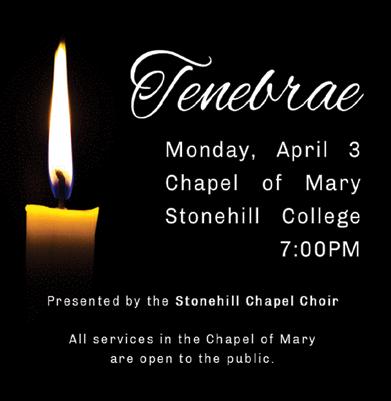


Archbishop Christophe Pierre, Apostolic Nuncio to the United States, and Msgr. Juan Antonio Cruz Serrano, Permanent Observer of the Holy See to the Organization of American States.
“Receiving this invitation to attend this event deeply touched my heart,” Mahoney told The Anchor “I was humbled and grateful to have been invited to attend such an important event in the life of Pope Francis and to share this with so many dignitaries from around the world and within the United States.”
Mahoney, a long-time member of the Fall River Diocesan Council of Catholic Women and was elected president of the NCCW, was invited as its representative. She will be installed as NCCW president on August 26 in Salt Lake City.
“Being able to represent the NCCW at this event was an honor,” she continued.
The archbishop greeted Mahoney at her arrival, as he did with all the guests. Following a dinner, the archbishop spoke to the gathering.
“In Archbishop Pierre’s remarks given at the event, he reminded us of Pope Francis’ concern for the poor, for those who need our help and for those who live on the peripheries of our society,” said Mahoney. “He encouraged us to pray for Pope Francis and reminded us of his words on the balcony of St. Peter’s when he was introduced to us after his election, he stated, Pope Francis asked us to pray for him.”
Archbishop Pierre spoke about the legacy of Pope Francis first 10 years, especially his love for the poor and his decision to take the name Francis after St. Francis of Assisi, a champion of the poor.
“I had the opportunity to speak with many of the cardinals, bishops and dignitaries present, was able to thank our military armed forces for their services and to converse with many of the lay organiza-
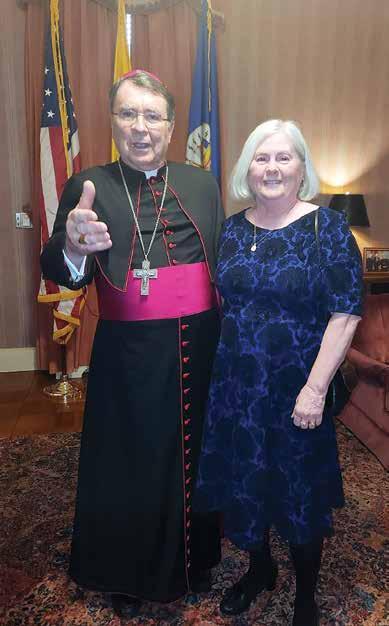
tions present.
“It is so energizing to be with others who share in ministry and who are involved in similar Church related projects.
“I left desiring to stay focused on the mission of the Church and to connect with many whom I met at this event.
“I look forward to future events and to representing the members of NCCW with compassion and honor.”
24,
March
2023
Archbishop Christophe Pierre, Apostolic Nuncio to the United States, greeted Beth Mahoney, principal of St. Stanislaus School in Fall River and president-elect of the National Council of Catholic Women at a March 13 event at the Holy See Nunciature in Washington, D.C., commemorating the 10th anniversary of Pope Francis’ election as the Holy Father.
Pope Francis has penned several major documents in first decade
VATICAN
CITY
(CNS) — In documents issued his first 10 years in office, Pope Francis covered topics as diverse as strengthening one’s faith, evangelization, caring for creation, accompanying families and young people, and respecting Indigenous peoples.
He wrote a major document on reforming the Roman Curia, three encyclicals and five apostolic exhortations. The following is a list of his major texts:
Apostolic letters:
— “ Desiderio Desideravi ” (“I have earnestly desired”). In this 2022 letter, the pope insisted that Catholics need to better understand the liturgical reform of the Second Vatican Council and its goal of promoting the “full, conscious, active and fruitful celebration” of the Mass. He reflected on the power and beauty of the Mass, emphasized the need to limit celebrations of the liturgy according to the rite in use before the Second Vatican Council and called for greater awareness of the sacrifice of Christ and His real
presence in the Eucharist.
— “ Traditionis Custodes ” (“Guardians of the Tradition”) was published in 2021 and declared the liturgical books promulgated after the Second Vatican Council to be “the unique expression of the ‘ lex orandi ’ (law of worship) of the Roman Rite,” restoring the obligation of priests to have their bishops’ permission to celebrate according to the “extraordinary” or pre-Vatican II Mass.
— “ Vos Estis Lux Mundi ” (“You are the light of the world”). The document, published in 2019, revised and clarified norms and procedures for holding bishops and religious superiors accountable when accused of abuse or of covering up for priests or other Church workers accused of sexually abusing minors or vulnerable adults. It requires all priests and religious to report suspected abuse or cover-ups and encourages any layperson to report through a now-mandated reporting ”system” or office that must be set up in each diocese.
† Diocese of fall RiveR † official appointments

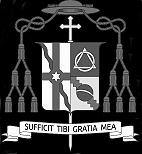
His Excellency, the Most Reverend Edgar M. da Cunha, S.D.V., Bishop of Fall River, has announced the following appointment :
Mr. Joseph Harrington as Vice-Chancellor for Administration of the Diocese of Fall River
Effective: March 13, 2023
Encyclicals:



— “ Lumen Fidei ” (“The Light of Faith”) was Pope Francis’ first encyclical, published in 2013. It was built largely on the work of his predecessor, Pope Benedict XVI, completing a trilogy of encyclicals on the theological virtues of faith, hope and love. The encyclical on faith encouraged Catholics to embrace their faith more fully.
— “ Laudato si ’, (“On Care for Our Common Home”) was published in 2015. He said his encyclical on the environment
was a means of entering into dialogue with all people about humanity’s responsibility toward “the common home that God has entrusted to us.”
— “ Fratelli Tutti ,” (“On Fraternity and Social Friendship”) was published in 2020. It highlighted what the pope said were urgent social, political and religious issues and the need to address them together based on the truth that all people are brothers and sisters, leading to greater solidarity and concern for the
poor and the Earth.
Post-synodal apostolic exhortations:
— “ Evangelii Gaudium ” (“The Joy of the Gospel”). The document on the proclamation of the Gospel in today’s world was published in 2013 with the aim of encouraging ongoing the missionary renewal of all members of the Church. Calling for a new chapter in evangelization, the pope also provided a clear guide to joy of the Beatitudes, the grace of 8 Turn to page nine
Upcoming diocesan events
On Saturday March 25, St. Margaret Parish in Buzzards Bay will have a fundraising concert to benefit a Catholic school in Poland that educates students from Ukraine.
The performers, Jolanta Ziemska and Maciej Ziemski, are not only a married couple but also a successful musical duo whose country of origin is Poland. As the duo Klavitarre, Jolanta, the pianist, and Maciej, the guitarist, have been performing together for 23 years. Both artists graduated with awards
from the Music Academy in Lodz, Poland, and Hochschule für Künste in Bremen, Germany, where they found romance and discovered their joint love of playing music.
After the 4 p.m. Mass, there will be a spaghetti supper and concert in the Parish Center.
Tickets for the dinner can be purchased in advance, contact the Parish Office at 508-759-7777.
On Tuesday, March 28, Father Tadeusz Pacholczyk, Ph.D., will give a presentation on the topic of transgender issues and gender dys-
phoria at St. John Neumann Parish in East Freetown. The event begins at 7 p.m.
The Fall River Diocese Vocations Office is teaming up with the Boston Archdiocese and Worcester Diocese to hold Quo Vadis Days from Thursday, June 22, to Sunday, June 25, at Anna Maria College in Paxton, Mass.
The retreat is for high school-aged boys and those entering freshman year or who have just graduated. More information and registration will be forthcoming. In the meantime, refer any inquiries to Father Kevin Cook or Father Jack Schrader.
March 24, 2023
What’s a good prayer for X? Y? Z?
Michael Ahearne
Father
of St. Monica Parish in Palm Fields, Ala., was preparing to take a group of parish teens on a cookout to teach them something about prayer, so he prepared himself by spending his morning meditation asking the Lord for eloquence and persuasion of speech. This prayer was repeated several times during the day before they all piled into cars for the trip to the camp grounds.
All the teens knew this was a prayer outing, so as soon as they had gathered around the adults at the fire pit, Tony A. called out, “Say Father, what’s a good prayer to get rid of zits?”
“Well, Tony, I th...” “Hey zitface,” came Suzie’s voice, “go to CVS and get some acne cream.”
“Suzie is right, Tony. We must not treat God like a magic genie who will do whatever we want if we use the correct
magic formula of prayer. Besides, zits will not bother a person forever.”
“Yeah, Padre, I guess you and Suzie are right, but I have some friends with real problems. Dave P. lives across town and his father drinks away most of his paycheck at the local bar and then brutalizes the family. No three Hail Marys are going to fix that!”
“What about my aunt and uncle back in England?,” broke in Veronica S. “They have a kid, my cousin, who gets into strange gangs, and got two girls pregnant. How are you going to fix that with a couple of prayers?”
“Whoa, guys, slow down! I don’t believe I ever said to you or anybody else that a couple of prayers would on their own help solve all real problems. Now listen up! Our parish is named after St. Monica, and it’s about time for you to learn that saints were real people with real problems.
“St. Monica was born in the year 332 A.D. in a town of North Africa

called Thagaste. When she was about 22, she married Patricius, a violent man 18 years her senior, a man of no religion, a man who had no intention of keep -

name, Adeodatus (given by God).
for the wayward kid of Monica of Thagaste.

ing his marriage vows. Through her prayers and kindness, love and patience, she led him to the Catholic faith before his death. At the same time, her eldest son, Augustine (Gussie to his buds), was away at school in Carthage, trying to prove he was a man. His live-in girlfriend bore him a son when Augustine was 17. For the non-Catholic group he was running with at the time (the Manichees), bringing a child into the world was the greatest of sins. Therefore, he denied having any part in it and blamed the birth on God. He claimed that the child was a gift given by God, and that became his
“The faithful livein girlfriend was sent back to Africa from Italy where they were now living and a suitable bride was selected for Augustine, the son of Patricius, a Roman magistrate, but she was still a child and would not reach the legal age for marriage for another two years. Gussie was impatient, so he took another concubine, but that didn’t last. He and his son Adeodatus were converted and baptized by Bishop Ambrose of Milan at Easter in the year 387. Three years later Adeodatus died at the age of 17.”
“Augustine, a school teacher by trade, gave himself completely to God and became the Bishop of Hippo. For approximately the next thousand years his writings became the standard for Christian theology in Europe, and they are still valued today, and through his writings he is known as one of the primary sources of Western Civilization. Not bad
“These few words only give a hint of the drama and triumph of that family from Africa. Now, all of you on this cook-out have much greater knowledge of computers than I have, so I challenge you to fill in the story by a Google search for Adeodatus ... Wikipedia. (I am suggesting reading about Augustine on Wikipedia because it is much shorter than the extended computer article, of which 1019 and 1414 given above are just pages.) I’d also suggest Gussie’s Letter 130 To Proba, which can also be found on the computer.
“It seems the adults have cleaned up our mess, so let’s go home.”
Later that night as Father Ahearne was at his evening meditation, he seemed to hear a voice: “Hey, Father Dork, the kids don’t need eloquence but rather honesty, openness, truth and love.” Amen.
Father Buote is a retired priest of the Diocese of Fall River and a regular contributor to The Anchor .
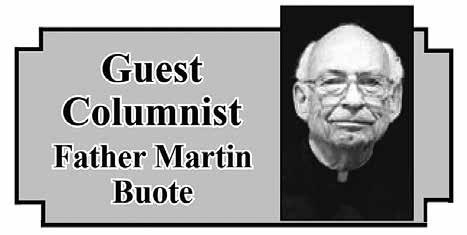

March 24, 2023
To advertise in The Anchor, contact Wayne Powers at 508-675-7151 or waynepowers@anchornews.org
Folded within the heart of Lent each year are flickers of joy, harbingers of light that reflect not only past events but future victories for those who have the eyes to see. Most prominent is the break from penitential purple on the fourth Sunday — called Laetare Sunday, reminding us of the joy at the foundation of our faith — but there are other elements as well. We are offered the Feast of Saint Joseph, Patron of the Universal Church as well as the incomparable Feast of the Annunciation, when Our Lady was invited to bear God in the flesh in her very womb.
We rejoice that St. Luke brings us reverently near to this sacred mystery, most likely from privileged conversations with the Blessed Mother, and has provided the Scriptural foundations for understanding God and creation on myriad levels. We can find through meditation, among so many other worthy things, an understanding of human freedom, a healthy anthropology, the divine economy, and elements of a fruitful prayer life. So much of the Church’s trajectory since that moment has drawn from this singular encounter, and here we can ponder one ancient celebration that still reverberates today.
Since the Middle Ages, the Church, in seeking concrete ways to honor the stupendous moment

Baptism and the cross

of the Incarnation, established that a Sunday close to the Annunciation would be called Mothering Sunday. The beauty in this concept is that not only was it to commemorate that our gift of salvation was made possible by the conception and birth of a child — both ordinary and extraordinary as every mother knows — but to teach us that the Virgin Mary was not only the mother of Our Lord (and subsequently our mother as well) but an icon of the Church who would embrace all who sought to love and serve her Son.
To that end, the celebration encouraged all Christians to return to the Church where they had been baptized, which allowed honor to be shown to the Sacrament as well as creating the opportunity for a reunion of sorts within families who may have suffered separation for one reason or another. Thus the layered reality of human mother, spiritual mother, and Sacramental Mother are woven together to remind us that grace builds on nature. As the “Catechism” teaches: “The Church’s first purpose is to be the sacrament of the inner union of men with God. Because men’s communion with one another is rooted in that union with God, the Church is also the sacrament of the unity of the human race. In her, this unity is already begun, since she
gathers men ‘from every nation, from all tribes and peoples and tongues’; at the same time, the Church is the ‘sign and instrument’ of the full realization of the unity yet to come” (775). Another thing that
know that all of us who have been baptized into Christ Jesus were baptized into His death? We were buried therefore with Him by baptism into death, so that as Christ was raised from the dead by the glory of the Father, we too might walk in newness of life” (Rom 6:3-4; cf. Col 2:12).

reinvent ourselves. Sexual complementarity is at the core of who we are, and only in embracing it — with all its beauty and challenges — will we find peace in this life and joy hereafter.
every mother knows is that the joy of bearing children is laced with pain and suffering: physical, relational, and spiritual. Such is life in a fallen world, and grafting Baptism into the celebration of motherhood should remind us that the Sacrament of Baptism — although marked by white garments and festive meals — is oriented to the very Passion of Christ. In the words of St. Paul: “Do you not
This mysterious reality is what gives meaning to suffering, which can be a tremendous channel of grace to those who willingly keep company with Our Lady at the foot of the cross. It also elevates motherhood into a supernatural reality commensurate with how fatherhood is meant to echo the Fatherhood of God. Together, these inalienable truths undergird all of creation, and while being disputed at every turn, must be defended at all costs. We didn’t create ourselves, we didn’t save ourselves, and we cannot
Of course, as Christendom lost its Christian, life-giving hold in society, this holy day (like so many others) devolved into a one-dimensional tradition called Mothers Day, but there’s nothing stopping us from celebrating our Baptism, visiting those places that were instrumental in our spiritual journey, and thanking God and His mother for bringing us into the family. Suffer sweetly the thorns we encounter along the way, and remember it was Christ’s own crown from which they fell.
Anchor columnist Genevieve Kineke is the author of “The Authentic Catholic Woman.” She blogs at feminine-Genuis. typepad.com.

March 24, 2023 Visit the Diocese of Fall River website at: fallriverdiocese.org
Understanding PoPe Francis From the inside
St. John Paul II once told George Weigel, author of “Witness to Hope,” that the problem with many previous biographers was that they tried “to understand me from outside. But I can only be understood from inside.”
The same thing might be said about and by Pope Francis, that many try to sum him up by inferences based on various things he’s done over his first decade as pontiff: travels, gestures, homilies, discourses, messages, letters, appointments, apostolic constitutions, encyclicals, exhortations, motu proprios, chirographs, and more.
How do we, however, best understand him from the inside?
The best key with which to do that is his understanding of God’s mercy.

At the very moment his pontificate began, when he accepted the election of his brother cardinals ten years ago, he did not say merely “Accepto,” which is the way Popes normally assent to their election. As he stated in the first of what have become many interviews, he told Father Antonio Spadaro he replied in Latin, “I am a sinner, but having trusted in the mercy and infinite patience of our Lord Jesus Christ and in a spirit of penance, I accept.”
When Spadaro asked him in the same interview, “Who is Jorge Mario Bergoglio?,” the Holy Father replied, “I am a sinner whom the Lord has looked upon” with mercy. He added, “I always felt my motto, Miserando atque Eligendo, was very true for me,” that the Lord, looking upon him with merciful love, chose him first to be a priest and religious, then a bishop, and finally the successor of St. Peter.
On Sept. 21, 1953, everything in his life changed. He stopped into his parish church and saw a priest he didn’t know, Father Carlos Duarte Ibarra, and, without much forethought, asked him to hear his confession. He exited the confessional five minutes later, intending no longer to become a chemist but a priest. He recognized that God had been waiting for him in the confessional to fill him with his mercy and that, miserando atque eligendo, was choosing him to be a minister of that mercy to others.
That conviction has been the principal leitmotif of his Christian life, priesthood and papacy.


In a 2010 book length interview, El Jesuita, Cardinal Bergoglio said that an authentically Christian discipleship begins with our recognition that we’re sinners in need of salvation and the concomitant experience that that Savior looks on us with merciful love.
“For me,” he said, “feeling oneself a sinner is one of the most beautiful things that can happen, if it leads to its ultimate consequences. … When a person becomes conscious that he is a sinner and is saved by Jesus, … he discovers the greatest thing in life, that there is someone who loves him profoundly, who gave His life for him.”
He lamented that many Catholics have sadly not had this fundamental Christian experience. “There are people who believe the right things, who have received catechesis and accepted the Christian faith in some way, but who do not have the experience of having been saved … and who therefore lack the experience of who they are. I believe that only we great sinners have this grace.” After his election, he added, “Only the one who has been touched and caressed by the tenderness of his mercy really knows the Lord.”
On the first of his papacy, he sought to open up both the Church and the world to this grace. In his homily at the Vatican’s parish church of St. Anne and in his meditation from his study window before a crowd of 300,000, he stressed what he discovered back on Sept. 21, 1953, saying, “The Lord never tires of forgiving: never! It is we who tire of asking for his forgiveness. Let us ask for the grace never to tire of asking for forgiveness, because God never tires of giving his forgiveness.”
He has said the “whole Gospel, all of Christianity,” is contained in the joy God has in forgiving us. The “most profound mission of Jesus,” he stated, “is the redemption of all of us sinners.” God’s “name” and “identity card” are mercy. Mercy is God’s “most powerful message.” It is “the very foundation of the Church’s life” and her “primary task.” It is “the true force that can save man and the world.”
Because of these convictions, he convoked a Jubilee of Mercy in 2015-2016 to help the Church to “rediscover the meaning of the mission entrusted to her by the Lord on the day of Easter: to be a sign and an instrument of the Father’s mercy.”
For the Jubilee, he wrote two documents, “The Face of Mercy” and “Mercy and Misery,” which are both beautiful summaries of the centrality of divine mercy in the life and mission of the Church. During the Jubilee, he instituted the Missionaries of Mercy, originally about 1,100 of the 410,000 priests in the world, to be “persuasive preachers of mercy,” and “living signs of the Father’s readiness to welcome those in search of His forgiveness” through their dedication to hearing confessions. He gave them special faculties in the confessional to be able to remit the censures and heal the sins that are normally reserved only to the Holy See. At the end of the Jubilee, he extended the faculties of willing Missionaries indefinitely, and in the new apostolic constitution for the Church published last June, he made the Missionaries of the Mercy a permanent part of the structure of the Church.
Throughout his papacy, he has given greater attention to those in greatest need of God’s mercy, to those on the “existential peripheries,” to the one lost sheep, than to the 99 still in the fold. He sees this in imitation of the Lord, who “has a certain weakness of love for those who are furthest away, who are lost. He goes in search of them.”
That preference has occasionally been a source of frustration to the 99, who can sometimes be left feeling confused or neglected by a pope who prioritizes meeting with non-Catholic reporters, fallen away Catholics, critics of the Church, LGBT activists, pro-abortion politicians, tarred ecclesiastical figures, and others rather than some cardinals or bishops who have requested appointments. The 99 can complain, to use one of Pope Francis’ most famous quips, that he has the “smell” of the lost and black sheep but not of those who are striving to follow the Good Shepherd’s voice.
Pope Francis, however, is clearly convinced that in doing so, he is following the lead of the One for whom he is earthly vicar. He sees this prioritization as a means of engagement with prodigal sons and daughters. “Let us always remember,” he wrote during the Jubilee, “that God rejoices more when one sinner returns to the fold than when ninety-nine righteous people have no need of repentance.”
This focus on the lost sheep, however, does not mean that he is unaware of, or somehow blesses, their sins. He has regularly made a distinction between what he calls “sinners” and the “corrupt.” Sinner are those who recognize they’ve fallen and need God’s forgiveness; the “corrupt” are those who have become so hardened in their sin that they do not repent and treat vice as virtue. He has repeatedly and fiercely called the corrupt to conversion precisely so that they might receive mercy.
“Mercy exists,” he has written, “but … if you don’t recognize yourself as a sinner, it means you don’t want to receive it.” When asked, for example, about his famous words, “Who am I to judge?,” made in response to a question to a priest caught in a same-sex sexual scandal, he later clarified, “I prefer that [practicing] homosexuals come to confession, stay close to the Lord, and that we all pray together.”
He has sought throughout his papacy to make mercy “a verb,” by receiving and sharing it. He has, like St. John Paul II before him, prioritized hearing confessions, as he did last weekend in a Roman parish. He has often said how much he longs “to be able to walk into a church and sit down in a confessional again!,” because he regards the priesthood as a call to be “ministers of mercy above all.” He has regularly appealed to the Catholic faithful to come to confession and not to be afraid.
He has said that the Church is “called above all to be a credible witness to mercy, professing it and living it as the core of the revelation of Jesus Christ.” He has sought to be that type of credible witness throughout his priestly life and papacy.

That’s the best way to understand him from the inside, on his own terms.
Daily
Readings † March 25 - April 7

Sat. Mar. 25, Annunciation of the Lord, Is 7:10-14; 8:10; Ps 40:7-11; Heb 10:410; Lk 1:26-38. Sun. Mar. 26, Fifth Sunday of Lent, Ez 37:12-14; Ps 130:1-8; Rom 8:8-11; Jn 11: 1-45 or 11:3-7,17,20-27,33b-45. Mon. Mar. 27, Dn 13:19,15-17,19-30,33-62 or 13:41c-62; Ps 23:1-6; Jn 8:1-11. Tue. Mar. 28, Nm 21:4-9; Ps 102:2-3,16-21; Jn 8:21-30. Wed. Mar. 29, Dn 3:14-20,91-92,95; (Ps) Dn 3:52-56; Jn 8:31-42. Thu. Mar. 30, Gn 17:3-9; Ps 105:4-9; Jn 8:51-59. Fri. Mar. 31, Jer 20:10-13; Ps 18:2-7; Jn 10:31-42.
Sat. April 1, Ez 37:21-28; (Ps) Jer 31:10-13; Jn 11:45-56. Sun. April 2, Palm Sunday, Procession: Mt 21:1-11. Mass: Is 50:4-7; Ps 22:8-9,17-18,19-20,23-24; Phil 2:6-11; Mt 26:14—27:66 or 27:11-54. Mon. April 3, Is 42:1-7; Ps 27:13,13-14; Jn 12:1-11. Tue. April 4, Is 49:1-6; Ps 71:1-4a,5-6ab,15,17; Jn 13:2133,36-38. Wed. April 5, Is 50:4-9a; Ps 69:8-10,21-22,31,33-34; Mt 26:14-25.
Thu. April 6, Evening Mass of the Lord’s Supper: Ex 12:1-8,11-14; Ps 116:1213,15-16bc,17-18; 1 Cor 11:23-26; Jn13: 1-15. Fri. April 7, Mass is not celebrated today. Celebration of the Lord’s Passion: Is 52:13—53:12; Ps 31:2,6,1213,15-17,25; Heb 4:14-16; 5:7-9; Jn 18:1 —19:42.
March 24, 2023
OFFICIAL NEWSPAPER OF THE DIOCESE OF FALL RIVER Published bi-weekly, except for one week in autumn, by the Catholic Press of the Diocese of Fall River, 887 Highland Avenue, Fall River, Mass. 02720 , Tel. 508-675-7151 ; FAX 508-675-7048 ; email: davejolivet@anchornews.org To subscribe to The Anchor online visit www.fallriverdiocese.org;subscribe Subscription price by mail, prepaid $29.00 per year for U.S. addresses. Please send address changes to The Anchor, PO Box 318, Congers, NY 10920, call or use email address. PUBLISHER – Most ReveRend edgaR M. da Cunha, s.d.v., d.d. Vol. 67, No. 6 EDITOR; PRODUCTION MGR. david B. Jolivet davejolivet@anchornews.org EXECUTIVE EDITOR FatheR RiChaRd d. Wilson INTERIM EXECUTIVE EDITOR FatheR RogeR J. landRy - fatherrogerlandry@anchornews.org ADVERTISING Wayne R. PoWeRs waynepowers@anchornews.org POSTMASTERS send address changes to The Anchor, PO Box 318, Congers,
Editorial
N.Y. 10920. THE ANCHOR (USPS-545-020) Periodical Postage Paid at Fall River, Mass.
Faculty and staff of diocesan Catholic schools enjoy a day of spiritual renewal
FALL RIVER — Once per academic year, the faculty and staff of every Catholic school in the Diocese of Fall River come together for a day of spiritual uplifting and renewal. In addition to regular faith formation programs at the individual school level, the Catholic Schools Office offers a day for approximately 550 Catholic school teachers, administrators, and staff to celebrate Mass with Bishop Edgar M. da Cunha, S.D.V., followed by a spiritual program. This year’s program featured award-winning musician, composer and inspirational speaker, Eric Genuis, and his team of three musicians, who treated the audience with a performance that one could expect at Carnegie Hall.
According to Genuis’ website, www. EricGenuis.com, “Music is a language beyond words with the ability to stir the heart, inspire the mind, and enliven the soul. It is my sincere desire that my music will awaken hope, uplift the emotions, renew the spirit, and resonate within the heart of our shared human experience.”
In addition to the original music created for piano, cello and violin, Genuis delivered inspirational messages of faith, hope and joy. A major part of Genuis’ story is his prison ministry where he brings his orchestral music to inmates who may never have previously heard this type of music before. Recently, he played his 1,000th prison concert in places as difficult as “deathrow” where his message of the dignity of human life carries an even more poignant meaning.
At the end of the two-hour concert, there was a standing ovation by all in attendance. Exclamations of praise and excitement filled the


auditorium as the program ended. In feedback forms, teachers expressed gratitude for the day.
“I thought it was the best spiritual day since I have been a part of the diocese. The day was inspirational, thought provoking and relaxing at the same time. Thank you for a wonderful day.”
“How important it is for us to be aware of and do our best to reach out to the oft-forgotten, whether in our society or schools. We are all God’s precious children with inherent dignity no matter what.”
“I am always inspired when people who have superb talent, share their talent with those who are considered ‘least’ in our society. Also, Eric’s personal story is an important reminder that with every Good Friday, there is an Easter Sunday.”
“[It was a]reminder of the expression ‘walking in the shoes of another person’s shoes’ and ‘don’t take any gifts in life for granted.’”
Marian Desrosiers, Director of Catholic Mission and Identity for the Diocese of Fall River Catholic Schools Office, commented, “A co-worker brought Eric’s work to my attention and I immediately knew that this would be a perfect fit for our educators. Every year we strive to bring a different message to our educators and this is the first time the program included a group performing orchestral music. Moreover, the young age and extreme talent of the musicians have truly inspired our team so much that we are already considering bringing this program to our students.”
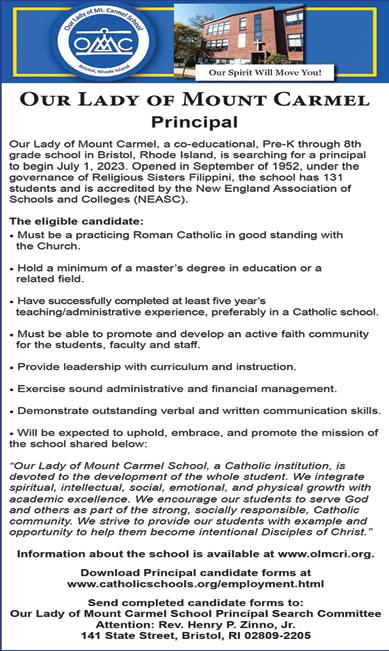
“A major goal of the day is spiritually to rejuvenate teachers and administrators across the diocese,” said Dan Roy, diocesan Superintendent of Catholic Schools. “We are inspired by how our educators give so much to their students and families, and we know that such grace-filled days together are needed. Eric Genuis took us on a spiritual and musical journey right for Lenten season. It is good to remember and experience how music elevates the soul, bringing us together in a community of Catholic educators. The four musicians played with such sincerity, generously sharing their God-given talents.”
Genuis performed a second show later that evening at Corpus Christi Parish in East Sandwich, where just more than 100 people attended.
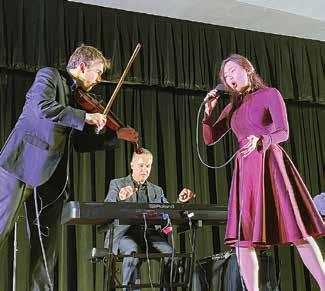
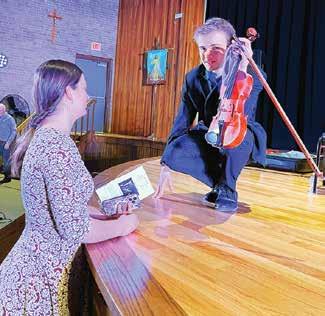
March 24, 2023
Violinist John Fawcett, a member of Eric Genuis’ ministry speaks with a teacher who also provided the violin music for the Mass, at the recent Professional Day for faculty and staff of diocesan Catholic schools.
Catholic musician and speaker Eric Genuis plays keyboards with his team members at the recent Professional Day for faculty and staff of diocesan Catholic schools.
A large gathering of area Catholic faithful were in attendance for the return of the annual diocesan Women’s and Men’s Conference, held at Stonehill College in Easton. There they heard speakers, took part in a Q & A session, had the Sacrament of Confession and Eucharistic Adoration available, and other inspiring opportunities. (Photo by John Kearns Jr.)
Return of Women’s and Men’s conference draws many
continued from page one our needs and desires.”
The bishop expressed his hope that those who attended the conference would go on to share their encounter with Jesus with those in their parishes, in their homes, like the Samaritan woman did in her
own town.
“Now that you have encountered Jesus,” the bishop said, “you can become an instrument of transformation for the world.”
Earlier in the day, conference keynote presenters were Fall River Dioce-

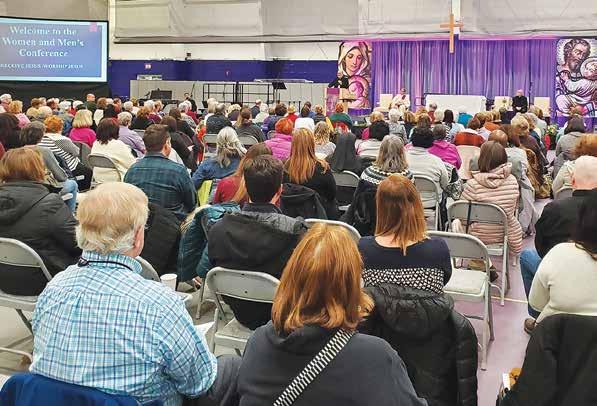


san priest Father Roger Landry who is among 56 priests across the country commissioned to serve as a National Eucharistic Preacher and Mari Pablo of The Evangelical Catholic and Ascension Press. Their presentations
were followed by a breakout session offered in three languages during which conference participants discussed what they heard and their response to it particularly in relation to their own lives of faith and experiences in their parishes.
The conference also featured a lively general Question and Answer session with both presenters and Bishop da Cunha responding.
During breaks in the program, participants had time to venerate relics of Blessed Carlo Acutis and St. Manuel Gonzolo Garcia, co-patrons of the National Eucharistic Revival; spend time in Adoration; view the 60-plus panel display of Eucharistic Miracles;

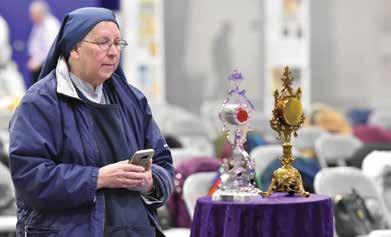
and visit with exhibitors and vendors present in the conference venue.
Beth Mahoney chaired the Planning Committee for the Women’s and Men’s Conference. She said that “many attendees commented ‘it was good for us to be here,’” as they were leaving the complex.
“It was certainly good for us to offer, once again, the Women’s and Men’s Conference in person,” she added. ”The atmosphere was joyful, the speakers inspiring; you could sense a good spirit among those present. In so many ways, the conference provided opportunities to deepen our spiritual lives, helping us to continue to be focused on our Lenten journey.”
March 24, 2023
A Daughter of St. Paul attending the diocesan Women’s and Men’s Conference venerates relics of Blessed Carlo Acutis and St. Manuel Gonzolo Garcia, co-patrons of the National Eucharistic Revival. Below, people brows the tables of several vendors at the event.
(Top photo by Deacon Alan Thadeu. Bottom photo by John Kearns Jr.)
Documents of Pope Francis
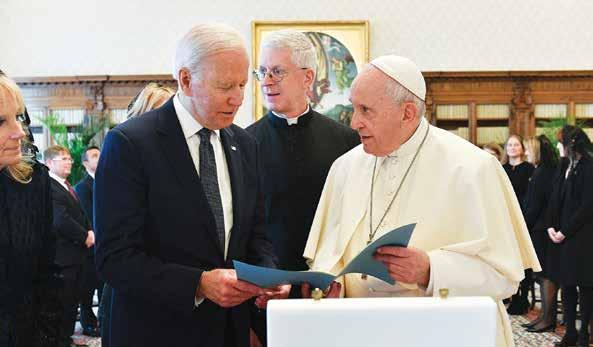
continued from page three discernment and the signs of holiness that express a person’s love for God and neighbor.

— “ Amoris Laetitia ” (“The Joy of Love”). The pope’s 2016 post-synodal exhortation on marriage, love and family life brought together the results of the two Synods of Bishops on the family, looking at the challenges experienced by families and affirming the importance of accompaniment when providing pastoral care, particularly to people seeking to regularize their marriages.
— “ Gaudete et Exsultate ” (“Rejoice and Be Glad”). The 2018 apostolic exhortation on the call to holiness challenged Christians to take the dignity of all human life seriously, viewing it in light of Christ’s incarnation. The pope offered a road map for simple ways that everyday people can be holy.
— “ Christus Vivit ” (“Christ is Alive”), published in 2019, was the pope’s response to the 2018 Synod of Bishops on young people, their faith and vocational discernment. In the text, the pope told young people they are loved and valued and needed by the Church and he pleaded with older members of the Church not to stifle the enthusiasm of the young, but to offer gentle guidance when needed.
— “ Querida Amazonia ” (“The Beloved Amazon”) was a 2020 post-synodal exhortation
in response to the Synod of Bishops for the Amazon. It called for an end to exploitation of the Indigenous peoples and the natural resources of the Amazon and for greater efforts to organize regular pastoral care of Catholics in the region, including by recognizing the role women play in Catholic communities, respecting popular forms of piety and working to inculturate the faith in Amazonian cultures.
Apostolic constitution:

— “ Praedicate Evangelium ” (“Preach the Gospel”). The pope’s long awaited apostolic constitution on the reform of the Roman Curia was released in 2022. It replaced St. John Paul II’s 1988 constitution, “ Pastor Bonus ,” and reorganized the Roman Curia to highlight its role in promoting the Church as a community of missionary disciples, sharing the Gospel and caring for all those in need.
© Catholic News Service / U.S Conference of Catholic Bishops.

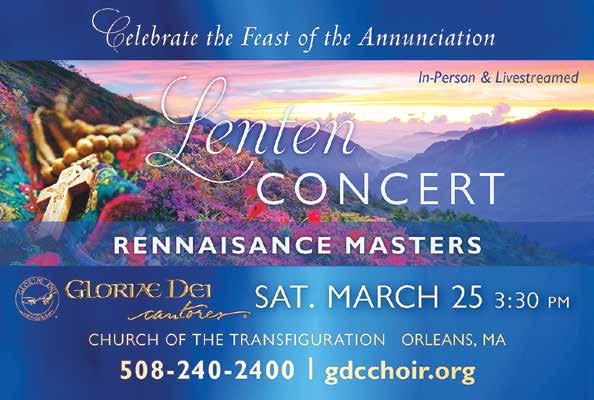
March 24, 2023
Pope Francis gives one of his documents to U.S. President Joe Biden during a meeting at the Vatican in this file photo from Oct. 29, 2021. The pope gives visiting heads of state copies of his major texts. (CNS photo/Vatican Media)
Bishop’s Blog: Women’s and Men’s Conference recap
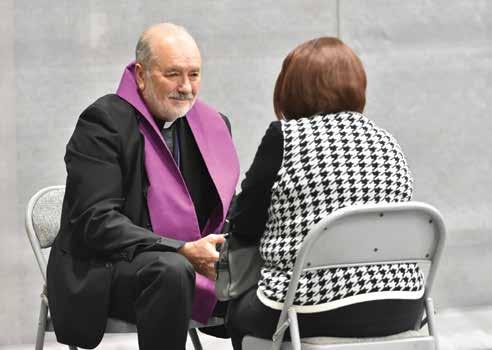
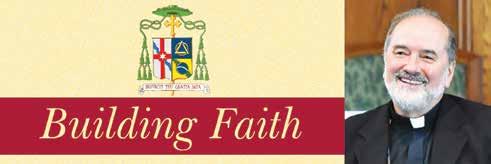
Being at the diocesan Women’s and Men’s Conference with so many men and women from our diocese renewed a great sense of hope in me. We had been praying for this day, not only for the event to come together, as it did so beautifully, but also that participants would be nourished by a true encounter with Jesus. My personal prayer, as I expressed in my opening remarks, is that all in attendance would experience strengthening and renewal of faith, which would be brought back to their parishes and homes as fuel for their work of building God’s kingdom here on earth. The conference offered opportunities for us to encounter Jesus in His Word, in prayer, and most importantly, through the Eucharist. Jesus is
the ever-present, ever-powerful light amid darkness. An effective encounter, especially with Jesus, causes us to change. If we experience Christ and remain the same, then we have missed the grace,

follow after a real encounter with the Lord — we should never be the same again.

So many examples can be seen in the Scriptures — Zacchaeus, called down from the tree he’d climbed to catch a

good it is to be here,” wanting to build tents for Jesus, Elijah, and Moses. Interestingly, Peter forgets himself; we, too, in finding Jesus, should desire to care for and serve others above our own needs.
the blessing, and the new life He has come to give each of us. Consider the Magi, the three kings; after encountering Jesus, they returned home through another route — they did not go back the same way. To me, this symbolizes the new direction we are called to
glimpse of Jesus. During the Transfiguration, the Apostle witnessed the glorified Lord, His divinity revealed by the Father. St. Peter, caught up in the moment, exclaims, “How
On Saturday, during the presentations, time spent in Adoration, the fruitful discussions, and of course, the celebration of the Mass, we all discovered so many blessings Jesus offers. For one day, as best as we could, we put aside our concerns, troubles, and the busyness of our daily lives to allow ourselves to rest in the Lord and open ourselves to the many lessons and graces this Lenten conference had to offer.

March 24, 2023 To advertise in The Anchor , contact Wayne Powers at 508-675-7151 or waynepowers@ anchornews.org
Bishop Edgar M. da Cunha, S.D.V., offers the Sacrament of Penance at the diocesan Women’s and Men’s Conference held at Stonehill College in Easton. (Photo by Deacon Alan Thadeu.
Dartmouth Ladies Guild to host conference for diocesan women

NORTH DARTMOUTH — The Ladies Guild of St. Julie Billiart Church invites women of the parish, the surrounding area, and the Diocese of Fall River, to join them in their first presentation of a Catholic Women’s Conference.
The conference theme, “Do Not Be Afraid,” is based on the words of the Angel Gabriel to Mary at The Annunciation. Throughout the conference, participants will learn the many lessons which the Blessed Mother can teach about acceptance, patience, and strength in bearing daily crosses.
This conference will strive to inspire women to develop a deeper relationship with Jesus and His Blessed Mother and will provide opportunities for fellowship and a renewal of their Catholic spirit.
This conference will include Holy Mass, other opportunities for prayer before the Blessed Sacrament, the Rosary, the availability to receive the Sacrament of Penance, vendors, and a light breakfast and boxed lunch.
There will also be
three guest speakers: Laura Phelps, Liz Cotrupi Pfunder, and Jean Revil.
Laura Phelps is a national speaker and author. Not too long ago she discovered that the Bible was actually meant to be opened and read, and now she wants everyone to open and read their Bibles too.
In 2016, after a personal encounter with Christ and an undeniable call on her heart to share her story with others, Laura joined Walking with Purpose, a women’s Catholic Bible Ministry. In 2019 Laura “took to the main stage” and since has spoken to countless numbers of women across the country in parishes and at women’s conferences.
Reliable, honest, and humorous, Laura generously shares the pain of her life, offering the hope and healing she has found through Jesus and Mary.
She is the author of
“Victorious Secret: Everyday Battles and How to Win Them,” and “Sweet Cross: A Marian Guide to Suffering.” She is a wife and mother of four living in Connecticut, and enjoys speaking to groups about her faith and writing her personal blog: www.
Faith Rallies, and retreats for a wide variety of ages. Most recently Liz led the musical reflection at the Rhode Island Catholic Women’s Conference.
She has been married to her husband, Bob, for almost eight years, and lives in Rumford, R.I. with their sixyear-old daughter, Gracie Anne.
tive in Catholic REC (Residents Encounter Christ) for more than 20 years, offering a three-day retreat for the incarcerated several times a year at the Dartmouth House of Correction along with weekly meetings of prayer, Scripture and fellowship.
lauramaryphelps.com
Liz Cotrupi Pfunder is a Catholic musician, songwriter, and speaker who for the past 10 years has been traveling nationally to spread the love of Christ. With a Master’s Degree in Theology, music from her original album “Unglued,” and a passion for worship, she seeks to see lives changed and hearts transformed by Jesus.
Liz has ministered at numerous Steubenville Youth Conferences, Life Teen Camps, Diocesan
Eucharistic Revival Event 2023
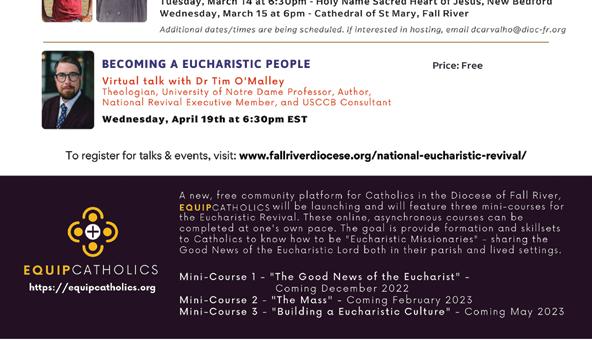

Jean Revil, a St. Julie Billiart parishioner, is an Oblate of St. Benedict associated with the Benedictines of Portsmouth Abbey. She is a former theology teacher and Campus Minister of Bishop Stang High School, having retired after 33 years of inspiring Stang students.
Jean has also been ac-
In 2016, Jean was hired to be the Director of Adult Faith Formation for both St. Joseph’s and St. Michael’s parishes in Fall River. In addition to preparing adults for RCIA, she also led Bible Study and seasonal learning events.
She believes that learning about our faith is a life-long endeavor that involves both learning the facts about Jesus Christ and growing in our relationship with Him.
To register and for more information visit saintjulie.org and click on the conference banner.
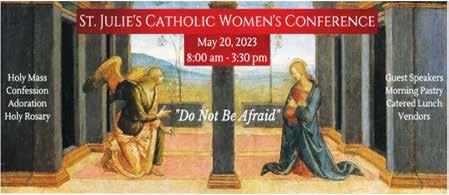

March 24, 2023
Pope Francis reminds we are all part of the same family
March 2023 marks the tenth anniversary of Pope Francis’ pontificate. It is too soon to estimate the historical impact of Pope Francis on the Church and the world, but there is no question that he has re-oriented the Catholic Church in order to meet the distinctive challenges posed by our increasingly secular world. Of the many themes that one could focus on, I want to reflect on those that can be most unifying for Catholics. Division within the Body of Christ is accepted by too many as a feature of being Catholic in today’s world. Factions and fixed mindsets have become the norm. Pope Francis has provided an antidote to this way by refocusing the Church on the primacy of God’s mercy, being a “poor Church for the poor,” Catholic social teaching (especially the rights of immigrants and care for the environment) and the centrality of evangelization. Not only are these unmistakable themes of this pontificate, but central elements of the Catholic tradition that all should embrace in unity.
In the Papal Bull, Misericordiae Vultus (The Face of Mercy) declaring the Extraordinary Jubilee of Mercy from 2015-16, Pope Francis declared, “Jesus Christ is the face of the Father’s mercy. These words might well sum up the mystery of the Christian faith.” There is no greater theme of this pontificate because there is no greater theme in the Catholic faith, and Pope Francis wants us to experience this mercy ourselves so we can better proclaim the Gospel! Sadly, participation in the
Sacrament of Reconciliation is sorely lacking in our Church today. There are many and varied reasons for this, but the pope has repeatedly called the faithful and priests back to the confessional to humbly confess our sins and experience God’s mercy in our own lives. Without first receiving mercy, we will prove ineffective in offering this gift to others.
The pope also reminds us that the way of Christ’s mercy is to go out in search of the lost, forgotten and voiceless. Pope Francis embodies this merciful call in a particularly powerful way. As a shepherd, he imitates Christ with his concern for the one lost sheep, even if this can be disconcerting at times for the ninety-nine.
In Misericordiae Vultus he wrote: “At times we are called to gaze more attentively on mercy so that we can be a more effective sign of the Father’s action in our lives.” Remember that quote when trying to understand the type of Church Pope Francis is calling us to be.
Rooted in God’s mercy, Pope Francis has reminded us of our call to be a “poor Church for the poor.” In the last 10 years, the Corporal Works of Mercy have taken central stage, and the pope’s actions have been even more powerful than his words. Whether it was his background as an archbishop taking the city bus to serve the poor in the slums in Buenos Aries, his visits to prisons on Holy Thursday, or his embrace of disabled persons, this pope reminds us of what Jesus
taught and how He lived. To serve and care for the basic needs of those who are disadvantaged and in need, both personally and societally, is a constitutive dimension of the Christian life. Throughout the Gospels Jesus warns us against the attachment to wealth and material possessions and identifies with those on
should also be concerns for his flock as well.
the margins or “peripheries” (as Pope Francis likes to say). To do likewise as a Catholic is not optional if we seek to be authentic in our discipleship of Jesus Christ.
Flowing from the Corporal Works of Mercy, Catholic Social Teaching has received a special emphasis and focus during the reign of Pope Francis. Our commitment to respect life, serve the poor, promote the dignity of work and rights of workers, advance human development, care for the environment and work for peace and justice is part and parcel of the Christian life. And yet, some ignore or compartmentalize this essential way of life for Catholics. Pope Francis wants us to understand that we cannot know God if we do not integrate our tradition’s social teaching into the very fabric of our lives, parishes, schools and ministries. Caring for the environment and welcoming migrants are matters of particular prophetic concern for the pope, and
Like St. John Paul II’s teaching on human solidarity, Pope Francis has focused on fraternity among peoples. How many of us, for instance, would prefer to deepen the divisions that are so stark in our Church and our world. Inspired by St. Francis, in his encyclical Fratelli Tutti (All Brothers), the pope writes: “In his simple and direct way, St. Francis expressed the essence of a fraternal openness that allows us to acknowledge, appreciate and love each person, regardless of proximity, regardless of where he or she was born or lives.” The pope reminds Catholics, and all people of conscience, they we are all part of the same human family. Most importantly, he calls us to live this way. Consider the impact his pastoral trips have had in war torn places like Iraq, the Democratic Republic of Congo and South Sudan. By all accounts, the pope has made very practical and lasting contributions to peace and fraternity wherever he has visited.
Evangelization is yet another great focal point of Pope Francis. With God’s mercy flourishing in our lives through acts of mercy, service and fraternity, we are best positioned to evangelize effectively. In the encyclical, Evangelli Gaudium (The Joy of the Gospel), he implores us to root our evangelical mission in Jesus Christ: “I invite all Christians, everywhere, at this moment, to a renewed personal encounter with Jesus Christ, or at least an openness to letting
Him encounter them. The Lord does not disappoint those who take this risk.” The pope reminds us that before we can share Jesus, we must know Jesus. And to really know Him, is to be a person of joy. This joy will draw others to Christ, but hypocrisy, judgmentalism and elitism will push people away.
While the virtues of our post-modern secularist world teach us comfort and security, as a Jesuit, the pope knows that evangelization often takes us to the uncomfortable frontiers and edges of society. The pope wants us to be a Church that goes to the streets and the forgotten places of the world. To be a Catholic, one must assent to follow Jesus wherever He may lead us. Discipleship may lead us through the deserts, slums or war zones of our world, but if we trust in Jesus, we will also be led to abundance. Pope Francis has learned this vital spiritual lesson and wants to share it with the Church.
It may be helpful to conclude this reflection on Pope Francis’ unifying teaching where he began his pontificate. After being announced to the world for the first time as pope on the balcony of St. Peter, the pope declared himself a humble sinner in need of our prayer. In that moment, and throughout his papacy, he reminds us that we are all sinners in need of God’s mercy and salvation. Without this awareness, our labors in the Church will lead to nothing.
Anchor columnist Peter Shaughnessy is a parishioner of St. Francis Xavier parish in Acushnet.
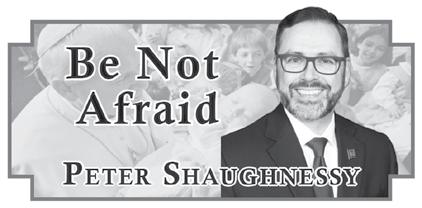


March 24, 2023 t he c hu R ch an D Y outh an D Y oung a D ults
Bishop Connolly family supports one another continued from page one for the future,” said Daniel S. Roy, Superintendent of Schools for the Diocese of Fall River. “We are committed to helping families transition to other diocesan Catholic high schools and to make the process as seamless as possible.”
Many have experienced across the diocese over the years, the closing of a school or parish is a death of sorts evoking feelings of grief and disbelief. But the Bishop Connolly community is trying to respond with resilience, support and faith in God.
In an interview with The Anchor, Bishop Connolly President and Principal, Kathleen St. Laurent shared how bittersweet the reactions have been. “This is so sad that such a beautiful family and campus is experiencing this loss,” she said. “As a community, we believe that God calls us to where we are supposed to be. It is heartwarming and encouraging to see the Connolly family being so supportive of each other.
“This is a grieving process, especially for the students and their families, and it’s unbelievable how they have reached out to us with support and gratitude.”
St. Laurent provided The Anchor with an example of the love expressed by families. In emails, a few parents wrote: “We are very saddened with the news of the closing of your school. We know how hard you and the staff work to build a community of love and values that we decided to send our daughter to your school. We appreciate everything you have done and we will pray for everyone.”
A second said, “I know all too well that school is a second home, not just for students, but for all the teachers and staff. Please know that you have all made such a difference in the lives of so many and that work will live on and reverberate in many homes, workplaces and communities.”
A third commented, “We are heartbroken with BCHS closing but appreciate all you have done.”
St. Laurent said that last September, the school had brought in a counselor from St. Vincent’s Services as an adjunct staff member, to be there for students should then need it. This was done without knowledge of what was to come. “The counselor has been working with students to help them with the transition, as have members of the faculty and administration.
“The students love this school and are a close knit group, but they are showing great resilience. They are truly a community of faith,” she said.
The faculty and staff are giving the students the assistance and encouragement they need to complete this school year, and beyond.
“We continue to experience very challenging times that have put an even greater financial strain on many families,” said Bishop da Cunha. “So many people have extraordinary needs amidst this economic uncertainty, and the diocese needs to leverage its precious resources to an even greater extent. We are confident that our Catholic school leadership will pro-
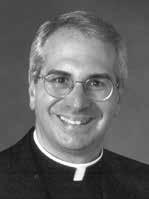
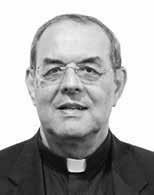
vide both pastoral support and educational guidance to all affected families so that their children can transition and be welcomed into a new Catholic school family.”
St. Laurent said that Timothy Sullivan and James Benson, presidents of Bishop Feehan High School in Attleboro and Bishop Stang High School in North Dartmouth respectively, are standing with the Connolly community during the final stages of this year and the students’ future next year. “Tim and Jim have already indicated that all students at Bishop Connolly are accepted in their respective schools should they choose to attend one or the other,” said St. Laurent.
She also said that the diocese will work with the faculty and staff in assisting them with their future endeavors. No one is being left behind without guidance and support.
In addition to the immediate Connolly family, many alumni have reached out with words of comfort and support.
“Bishop Connolly High School will live on in these students here today and those who have studied in these classrooms through the years,” St. Laurent told The Anchor. “The Bishop Connolly mission of being ‘Not only hearers, but doers of the Word,’ will carry on well past this sad time in its history. The mission will go on.”
Today, there are over 5,300 students from six weeks old through 12th grade in 19 Catholic schools from Attleboro to Cape Cod.
Diocese of Fall River TV Mass on the Portuguese Channel
Sunday, March 26 at 7 p.m.
Broadcast from Immaculate Conception Church in New Bedford
Diocese of Fall River TV Mass on the Portuguese Channel


Sunday, April 2 at 7 p.m.
Broadcast from Our Lady of the Holy Rosary Church in Providence
Diocese of Fall River TV Mass on WLNE Channel 6
Sunday, March 26 at 11:00 a.m.
Sunday, April 2 at 11:00 a.m.
Palm Sunday
March 24, 2023
Celebrant is Monsignor John J. Oliveira, P.A., a retired priest of the Diocese of Fall River and diocesan director of the Society for the Propagation of the Faith.
Celebrant is Monsignor Stephen J. Avila, V.F., pastor of St. Joseph, Guardian of the Holy Family Parish in Falmouth.
~ Subscriber Notice ~ Please note, beginning with the April 7 edition, The Anchor becomes a monthly publication.
Pope Francis: The differences of others are an occasion to love better
VATICAN CITY (CNS) — We should treat the physical and social differences of others as a chance to love, not as an inconvenience, Pope Francis said in his Angelus address on March 19.
The pope’s weekly message focused on the day’s Gospel reading, which recounts Jesus’ miraculous healing of the blind man.
Pope Francis pointed out the reactions of the different characters in the story and invited people to reflect on how they might respond in a similar situation.
“How do we welcome the difficulties and differences of others? How do we welcome the people who have many limitations in life, either physical like this blind man or social like the beggars we find on the street?” he asked. “And do we welcome these people as inconveniences or as occasions to draw near to them with love?”
He encouraged everyone to read Chapter 9 of the Gospel of John.
“Read about this miracle” of the healing of the blind man, he said. “It’s beautiful the way John recounts it.”
“You can read it in two minutes. But it shows how Jesus proceeds and how the human heart proceeds. The good human heart, the lukewarm human heart, the fearful human heart, the courageous human heart,” he continued.
The pope said the Gospel passage shows how each of the different characters react to Jesus’ healing of the man born blind.
Some are skeptics and some find it unacceptable, he said.
“In all these reactions, for various reasons, there emerge hearts closed in front of the sign of Jesus,” he said, “because they seek a culprit, because they do not know how to be surprised, because they do not want to change, because they are blocked by fear.”
This is similar to many situations today, he added. “When faced with something that is really a message of a person’s testimony, a message from Jesus, we fall into this: we look for another explanation, we don’t want to change, we look for a more elegant way out than accepting the truth.”
The blind man, instead, is the
March 24, 2023

only person who accepts Jesus’ gift well, the pope explained. “Happy to see, [he] testifies what happened to him in the simplest way: ‘I was blind, now I see.’”
Pope Francis said the Gospel is asking us to imagine ourselves in the same scene, so that we might ask what our own reaction would be.
“What would we have said then? And above all, what would we do today? Like the blind man, do we know how to see the good and to be grateful for the gifts we receive?” he asked.
He added: “Do we bear witness to Jesus, or do we spread criticism and suspicion instead? Are we free when faced with prejudices or do we associate ourselves with those who spread negativity and gossip? Are we happy to say that Jesus loves us and saves us, or, like the parents of the man born blind, do we allow ourselves to be caged in by the fear of what others will think?”
Or are we, he continued, “the lukewarm of heart who do not accept reality, and do not have the courage to say: ‘No, this is how it is.’”
After praying the Angelus, Pope Francis expressed his closeness to the people of Ecuador, who were hit by a 6.4-magnitude earthquake on March 18.
Hundreds of people were hurt and at least 15 people killed in the quake, which mainly affected southern Ecuador and northern Peru, BBC News reported.
“I am close to the Ecuadorian people and I assure of my prayers for the deceased and all those who are suffering,” the pope said.
He also wished a happy Father’s Day to all the fathers.
In countries such as Italy, Portugal, Spain, Bolivia, Honduras, and several others, Father’s Day is celebrated on March 19, the Catholic feast of St. Joseph.
“Today we wish all fathers well. May they find in St. Joseph the model, the support, the comfort to live their fatherhood well,” Pope Francis said, inviting everyone to pray the Our Father for fathers.
In 2023, due to March 19 falling on the Fourth Sunday of Lent, the liturgical feast of St. Joseph was moved to Monday, March 20.
Please pray for these priests and deacons during the coming weeks:
March 25
Rev. John J. Brennan, SS.CC. Retired Founder, Holy Redeemer, Chatham, 1991 Permanent Deacon Thomas Prevost, 2007
March 26
Permanent Deacon Francis J. “Frank” Camacho, 2019
March 27
Rev. James W. Conlin, Pastor, St. Patrick, Somerset, 1918
Rev. Msgr. Antonio P. Vieira, Pastor, Our Lady of Mt. Carmel, New Bedford, 1964
Rev. Richard W. Beaulieu, Former Diocesan Director of Education, Former Pastor, Notre Dame de Lourdes, Fall River, 2007
Rev. Manuel Garcia, Editor of Portuguese Missalette, Founder of The Promotora Portuguesa and Rooster Printing, 2019
March 28

Rev. Alfred J. Levesque, Pastor, St. Jacques, Taunton, 1960
Rev. Bernard A. Lavoie, Chaplain, Catholic Memorial Home, Fall River, 1972
Rev. Dieudonne Masse, OFM, Retired, Montreal, Canada, 1983
Rev. Howard A. Waldron, Retired Pastor, St. Thomas More, Somerset, 1985
March 29
Rev. James H. Carr, S.T.L., Assistant, St. Patrick, Fall River, 1923
Rev. Msgr. Edward J. Moriarty, Pastor, St. Patrick, Fall River, 1951
March 30
Rev. Edward Norbert, 1909
Rev. Aime Barre, On Sick Leave, Fall River, 1963
Rev. Benoit R. Galland, USN Retired Chaplain, 1985
Rev. Lucio B. Phillipino, Retired Pastor, Immaculate Conception, North Easton, 2002
Rev. Robert F. Kirby, Catholic Memorial Home, Retired Pastor, St. Theresa of the Child Jesus, South Attleboro, 2015
March 31
Rt. Rev. Msgr. George C. Maxwell, Pastor, SS. Peter & Paul, Fall River, 1953
Rev. Dennis Loomis, M.S., Vocation Director, La Salette Shrine, Attleboro, 2019
April 1
Rev. George A. Lewin, Pastor, St. Mary, Hebronville, 1958
Rev. Edwin J. Loew, Pastor, St. Joseph, Woods Hole, 1974
April 2
Rev. Adolph Banach, OFM Conv., Pastor, Our Lady of Perpetual Help, New Bedford, 1961
Rev. Donald Belanger, Pastor, St. Stephen, Attleboro, 1976
Rev. James B. Coyle, Retired Pastor, St. Dorothea, Eatontown, N.J., 1993
April 3
Rev. Henry F. Kinnerny, Former Pastor, St. Peter, Sandwich, 1905
Rev. Roger G. Blain, O.P., 2000
Rev. Clarence P. Murphy, Former Pastor, Our Lady of the Assumption, Osterville, 2010
April 4
Rev. Lionel Gamache, S.M.M., 1972
Rev. James F. McCarthy, Retired Pastor, Sacred Heart, Fall River, 1985
Rev. Gaspar L. Parente, Retired Pastor, St. Theresa, Patagonia, Ariz., 1991
April 6
Rev. Philip Lariscy, O.S.A. Founder of the New Bedford Mission, 1824
Rev. Edward J. Mongan. Retired Pastor St. Mary, North Attleboro, 1920
Rev. Msgr. John A. Chippendale, Retired Pastor, St. Patrick, Wareham, 1977
Rev. Lorenzo Morais, Retired Pastor, St. George, Westport, 1980
Rev. Msgr. William D. Thomson, Retired Pastor, St. Francis Xavier, Hyannis, 1987
Rev. Gerald E. Conmy, CSC, Associate Pastor, St. Ann, DeBary, Fla.,1994
Rev. Msgr. Francis J. Gilligan, P.A. STD, Archdiocese of St. Paul, 1997
Rev. Lucien Jusseaume, Chaplain, Our Lady’s Haven, Fairhaven, Retired Pastor, St Roch, Fall River, 2001
April 7
Rev. James A. Dury, Retired Pastor, Corpus Christi, Sandwich, 1976
Rev. Alvin Matthews, O.F.M., Retired, Our Lady’s Chapel, New Bedford, 1988
In Your Prayers
When the British Invasion (the second one, not the Tea Party one) hit the U.S. with an explosion of new music, I was just a pup. But upon first hearing and seeing the Beatles, I was hooked.
I thought how cool it would be to stand in front of a crowd holding a shiny guitar pumping out a song and singing along.
A few of my friends started taking guitar lessons, along with thousands of other American kids. I wanted to as well. But my parents wouldn’t let me. Not because they were totally against the music. In fact my mom loved Peter Noone, Herman from Herman’s Hermits. No, it was because I had already developed a track record for beginning something I wanted, only to abandon it shortly thereafter.
I learned a little Blues Harp (harmonica) and played a little bit with them when they were starting a garage band.
Despite not being able to be an axe man, I still loved the music. I wasn’t hooked on any one band, although a handful became my favorites. I just know I had music in my blood, and hearing the Blues for the first time solidified that fact.
As the years grew, my LP collection (long playing record album to those who may think I’m speaking in code) grew, as did my cassette collection and eventually CDs later on. I’ve stopped at CDs and can now be considered a dinosaur.
When I met Denise we always had FM radio on in the car, or even a boom box when we were outside. Music consumed me, and that wasn’t lost on my wifeto-be.
When we did get married (45 years ago this year), we went shopping in Providence (the one in Rhode Island, not the spiritual one). We stopped in a music store, just so I could drool over
It’s OK to make a nun cry
the plethora of electric and acoustic guitars on display. I absolutely fell in love with a blonde Gibson Epiphone six-string acoustic.
Denise looked me square in the eyes and said, “If you promise to stick with this and give it your all to learn how to play, it’s yours.” My mouth dropped open and I blurted, “I promise.” Boom, the blonde Epiphone made the ride back home with us.
I kept my promise. I got my hands on a book of guitar chords and practiced and practiced until my fingers bled. But I did it, although I knew as a young husband and father, my rock ‘n roll dreams were over.
I did develop an affinity for Christian music and ended up playing a five o’clock Sunday Mass each week with my family (two kids included) and other parishioners and a handful of youth.
Eventually I played dozens of Masses and prayer services and a few weddings. I was finally holding that shiny guitar and singing in front of a crowd — not of adoring fans, but singing praise to the One who was responsible for my talent.
I wasn’t, and I’m still not, a master of the guitar, but people can make out what I’m playing and that’s just fine with me.
Now to the crux of my column: Took long enough didn’t it?
I was asked by a group of Catholic Nurses to play a Mass celebrating significant anniversaries of a number of Religious Sisters in the area, some having devoted their lives to serving God and ministering to His people for 40, 50, and 60-plus years.
The Mass was in the beautiful Saint Anne’s Hospital chapel. An oasis of peace and calm amid the
nearby ER and operating rooms; amid the sickness and injuries and sometimes death.
It was the first time I played a Mass alone, but the chapel was the calm I needed.
I brought my 12-string acoustic with me because I feel it adds a depth and a fullness to the music, especially in an atmosphere like the chapel, and when I’m playing solo.
I can’t really remember the song list from the Mass, except one I chose for the Communion mediation. It was a favorite of mine — John Michael Talbot’s “Holy is His Name,” based on the Magnificat, Mary’s fiat, her yes to God’s asking her to be the mother of His Son.
After all had settled following the Eucharist, I began playing softly and slowly. As the song progressed, so did its effect on me. Somewhere during that meditation the congregation had disappeared and I was there, alone, talking to God. “My soul proclaims the greatness of the Lord .... And holy, holy, holy is His name.”
When I finished, I knew I had tears welled up and the chapel was silent — in a good way, not the way when people feel relieved the train wreck was over.
The celebrant completed the liturgy, and as I was putting my 12-string back into the case, I could see a small elderly Dominican Sister approaching me.
I started having flashbacks to my days at St. Anne’s School and the times when mischievous me (the maringouin, French for mosquito, as my dad would call me) was pulled aside and gently (most of the time) reminded of how I should act and how I, in fact, had
acted.
It evoked in me a hidden shiver. The Sister walked up to me and pointed a finger at me. “Oh no, not again,” I thought. She then said, “You made me cry.” I said, “I’m sorry, Sister, I didn’t mean to,” I said. She responded, “No, in a good way. The Magnificat has always been the example I’ve tried to follow during my time as a Sister. You touched my heart and soul. Thank you.” We embraced and parted ways, but the peace I had experienced playing the song was only magnified by the gentle woman’s reaction and response.
I have often told others, especially when they would share nun “horror stories” of how they were so nasty to students, that a large majority of the Sisters who taught me were kind, and Christ-like.
I, like thousands of others, read about the atrocities at schools in Canada where some Sisters mistreated and basically tried to eliminate the Indigenous culture there. I was appalled, but I also knew that the evil actions of the few can make the good look guilty as well. That happens in all walks of life.
From childhood through adulthood, some of, no, most of the kindest and warmest people I met were Religious Sisters, some of whom are still dear friends of mine to this day.
I am grateful for each of those good women who became, in one way or another, part of the fabric of my life, and I dedicate this column to them, past and present.
I say thank you to them for devoting their entire adult lives to God and His children, with their own fiats. And having made one of them cry remains one of the most warmest, most peaceful moments of this chaotic, anxiety-filled life of mine. In our hearts and souls that night we both knew for a fact that “Holy is His name.”
davejolivet@anchornews.org



March 24, 2023




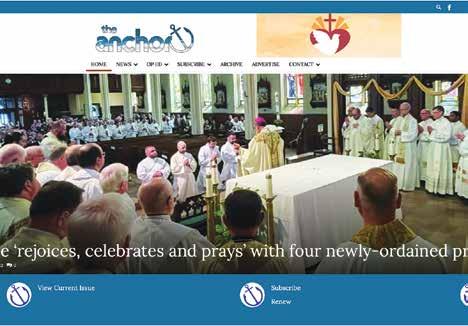
March 24, 2023 Please support the TV Mass Donate online at www.GiveCentral. org;FRTVMass Or mail your check payable to: Diocese of Fall River — TV Mass, 450 Highland Ave. Fall River, MA 02720 Please visit The Anchor website at www.anchornews.org










































